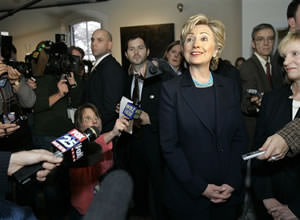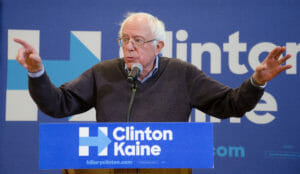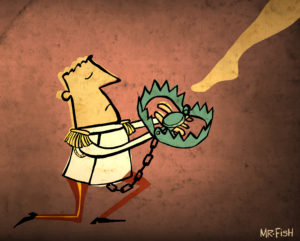Making a Case for the Long View
Reporters often live in the moment, focusing on the present and forgetting, at least temporarily, about the past and future -- a trait that works well for many journalistic beats. Boyarsky warns that "when such habits are brought to the political beat, we're all in trouble."
Political reporters are like geese, waking up to a new world each day as if the day before had never happened.
This intellectual and psychological quirk is invaluable to a reporter covering fires, murders and celebrity sex scandals. When I was a city editor, I didn’t want some reporter worrying about the past or future when a plane just went down. We lived for the moment. But when such habits are brought to the political beat, we’re all in trouble.
Take the Hillary Clinton story. After the Democratic debate at Drexel University in Philadelphia Oct. 30, in which she stumbled on the question about drivers’ licenses for illegal immigrants, Mark Halperin wrote on the Time Web site, “If she loses the nomination, tonight will go down in history as the first step to her defeat — no fatal ‘Dean Scream’ catastrophe, but far from her finest moment, to say the least.” Richard Wolffe, writing on Newsweek’s site, said: “The Drexel session may have produced only a faint drop of blood in the water. But it’s a sure sign that the feeding frenzy has begun.”
After the Democratic debate in Las Vegas on Nov. 15, the feeding frenzy disappeared under a torrent of boxing metaphors. (Vegas is a fight town.) CNN political editor Mark Preston observed, “Sen. Hillary Clinton stepped into the ring Thursday in this city known for prize fights, successfully beating back an onslaught of punches thrown from the left and right as her opponents sought to rattle the front-runner seven weeks before the Iowa caucuses.”
After leaving blood in the water in Philadelphia and emerging unscathed from the Vegas boxing ring, Clinton calmly assessed her situation in an interview with Katie Couric, guessing that the Democratic nomination probably won’t be settled until the big states, including California, hold their primaries on Feb. 5. “I think everybody should just take a deep breath and say ‘let’s just go to the finish line,’ which will be probably be midnight West Coast time on Feb. 5,” she said.
I understand the psychology behind a kind of coverage in which reporters lose both short- and long-term memory. I once was part of the journalistic club covering campaigns, spending many years apart from family and home engaged in an enjoyable occupation that allowed me to extend my adolescence into middle age.
As is the case with all clubs, there is pressure to conform. You don’t want to be too different from your colleagues, too much of an eccentric. You rationalize that the camaraderie is an important part of the reporting process. You can’t wander too far from the clubhouse — the bus or the plane — for fear you’ll miss something and your boss will be mad.
The fear of getting beat, or the determination to beat the competition, is the main reason that reporters, like geese, live for the day or even the moment. It’s particularly true this year with newspaper and television Web sites joining the 24-hour news channels in a competition where victories are measured in minutes.
“The competitive environment is so much worse, ” said Karen Tumulty, who used to be a colleague at the Los Angeles Times and now is a national political correspondent for Time. She told The Texas Monthly, “In the old days, the week would start slow and hit a crescendo right on deadline, but that’s not the way it is now. Anytime there’s breaking news, we don’t sit on it. It goes right on the Web site.”
“Most of the time the press is covering a war or crime or weather where incremental change matters,” said Tom Rosenstiel, director of the Project for Excellence in Journalism, which produces top-notch studies of news coverage. “But in a campaign, when your job is to explain who these people are and how they will govern, the incessant incrementalism of news may put us out of sync with the audience.”
A study by Rosenstiel’s organization found that 63 percent of the campaign stories were about subjects lending themselves to that sort of hasty coverage. They deal with tactics, gotchas, alleged mistakes and slight movement in the polls, strategy switches, et cetera. But a poll conducted by the Pew Research Center for the People and the Press found that 80 percent of those surveyed wanted more stories on issues and the candidates’ records and personal backgrounds.
These people remember what happened yesterday and in the years before. They also worry about the future — the real future, not a momentary bump in the polls. They recall the lying excuses for the Iraq war and want assurances we’re not heading into a new one in Iran. They remember what happened to Sen. Clinton’s health care plan. They want to know if she has the right stuff to succeed if given another chance.
This takes a better kind of journalism than what we are getting in the rush of the Iowa caucuses and the New Hampshire primary.
Your support matters…Independent journalism is under threat and overshadowed by heavily funded mainstream media.
You can help level the playing field. Become a member.
Your tax-deductible contribution keeps us digging beneath the headlines to give you thought-provoking, investigative reporting and analysis that unearths what's really happening- without compromise.
Give today to support our courageous, independent journalists.




You need to be a supporter to comment.
There are currently no responses to this article.
Be the first to respond.